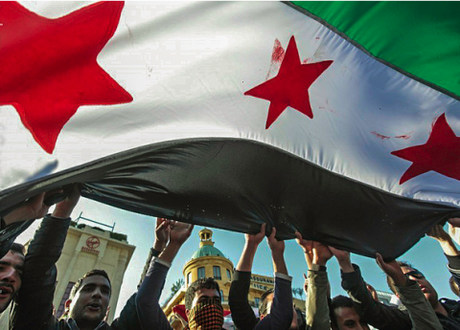 The Syrian independence flag: Is it time for Assad to go? Photocredit: Freedomhouse
The Syrian independence flag: Is it time for Assad to go? Photocredit: Freedomhouse
The background
Syria is entering a new phase of uncertainty, say reports, after the deaths of three top figures in President Bashar al-Assad’s regime in what is thought to be a suicide bomb attack. The president’s brother-in-law, Assef Shawkat; the defence minister, General Daoud Rajiha; and the head of Assad’s crisis team, General Hassan Turkomani were all killed; others were wounded. The conflict in Syria has been going on for over a year now. The International Red Cross has declared the situation to be a civil war, and £100 million worth of Assad’s assets have been frozen in the United Kingdom. Other rumours are swirling around: that Assad’s wife is in Russia, for instance. What is more certain is that in the past couple of weeks there have been high-level defections from the regime, including Syria’s ambassador to Iran.
Fighting continued throughout the night in many parts of Syria, reported the BBC. Two rebel groups have claimed the bomb, and predicted the government’s fall. The government, meanwhile, has promised to get rid of what it calls “criminal and murder gangs.”
The United Nations is to vote today (Thursday 19th July) on more sanctions; Russia says it will oppose the resolution. Commentators are asking whether this is the beginning of the end for Assad’s regime.
“I would have a very clear message for President Assad, which is it is time for him to go. It is time for transition in his regime. Clearly Britain doesn’t support violence on either side, but if there isn’t transition, it is becoming quite clear that there’s going to be civil war,” said David Cameron, Prime Minister, quoted on The Times.
The bombings are a jackpot for the opposition
“The opposition has hit the jackpot. The consequences are too big to digest. It may provoke more violence by the regime. Everyone is revising their calculations. People will be deciding whether to defect or not and the Russians will be wondering if they have backed the wrong horse,” said Nadim Shehadi, a Middle East analyst at Chatham House in London, quoted on The Guardian.
Assad’s on his way out – but there’s still time for him
“They have gone for the jugular now,” said Robert Fisk in The Independent. He said that though it took time to plan assassinations, “this was on an epic scale, to match the bloodbath across Syria.” There will be more attacks, too. The scenes in Syria now start to look like those in the Balkans. Bashar can’t flee; but there are tanks in Damascus. “The verdict? Going, but not yet gone.”
Syria’s allies will start to reconsider
The men killed in the bomb, said Anthony Loyd in The Times, were those who helped keep up Assad’s delusions. Their assassinations will have an immediate impact on the regime, and will hit Assad psychologically. The rebels, though, probably won’t take over any important institutions – the Syrian Army is still powerful. The Free Syrian Army (the rebels) is still “too lightly armed.” But what will happen is that the “knock-on effect of the bombing … will be felt in the halls of power in Moscow, Beijing, Tehran and Damascus.”
Russia won’t – it’s clinging on to the old world
Zaki Laidi in The Financial Times said that Russia isn’t changing its position with regard to Syria because it wants to ensure its own power in relation to the West. If Syria falls, then Russia’s “southern flank would be weakened.” The problem with Russia is that it doesn’t want to adapt – it wants to “return to the old world.” And it wants to make regime change too costly for the West to countenance.
Could something far worse happen?
Martin Chulov in The Guardian was uncertain about the effect of the bombs: “Whether the deaths of the strongmen can bring the masses around will determine whether this is indeed the beginning of the end – or the start of something far worse.”
But what happens next?
Yes, said an editorial in The Times, it’s “very likely” that Assad – “short of unleashing cataclysmic violence” – will go. But then what? How do we deal with what comes out of the ashes? Syria has a large stock of chemical weapons, which, post-Assad, could be stolen by terrorists; Syria is in a volatile region – it’s still at war with Israel. We need “to begin to talk about what happens now.”

